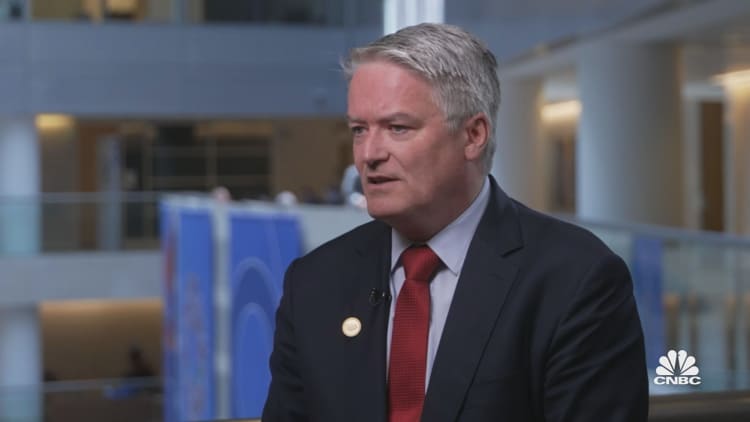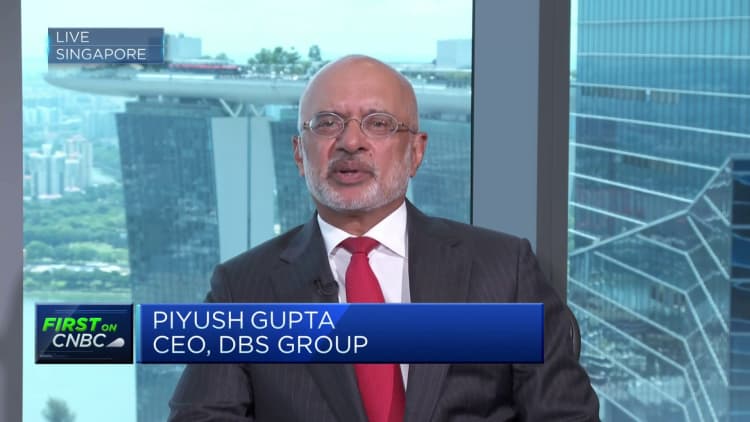Rashtrapati Bhavan, the official residence of the President of India in New Delhi.
Jiang Lai Di Timah Gong | The Moment | Getty Images
According to the Organization for Economic Co-operation and Development, India’s economic growth is expected to outpace China’s this year and next.
In its latest Global Economic Prospects report, the OECD predicts that India, China and Indonesia will exceed GDP forecasts for 2023 and 2024. Overall, the group expects the global economy to grow by 2.7% this year.
That would be the second-lowest annual rate since the global financial crisis, barring the 2020 Covid-pandemic year, it said.
OECD Chief Economist Claire Lombardelli said: “Falling energy prices and headline inflation, easing supply bottlenecks and the reopening of the Chinese economy, combined with strong employment and relatively resilient household finances, are helping achieve the expected recovery.”
“Nevertheless, the recovery will be weak by past standards,” she said, adding that monetary policymakers would “need to tread a difficult path”.
The OECD expects India to grow by 6% in 2023; China by 5.4% and Indonesia by 4.7%.
India’s full-year growth in 2022 The group said it expected the momentum to continue into this year following higher-than-expected farm output and strong government spending. The OECD added that looser monetary policy in the second half of next year would help household spending regain momentum. It also expects the RBI to shift to dovish rate cuts from mid-2024.
Average headline inflation across OECD countries is expected to fall to 6.6% this year after peaking at 9.4% in 2022, the report added. It also forecasts that the UK will experience the highest levels of inflation among advanced economies this year. Of the focus countries for the OECD’s inflation analysis, only Argentina and Turkey are expected to have higher headline inflation.
To combat inflation and address the problems facing the global economy, the OECD recommends that governments adopt the following three measures: maintain tight monetary policy; phase out and target fiscal support; prioritize growth-enhancing spending and supply-boosting structural reforms.
“Budget deficits and debt levels are higher than before the pandemic in almost all countries,” the group said in its report.
“Careful choices are needed to preserve scarce budgetary resources for future policy priorities and ensure debt sustainability,” it said.
“Fragile” Improvements
However, the OECD warned that the global economic recovery remains fragile as central banks continue to tighten monetary policy, which could weigh on financial markets.
“The key concerns are the possible emergence of new vulnerabilities in the banking sector, leading to a broader loss of confidence and a sharp contraction in credit, as well as heightened liquidity mismatch and leverage risks in non-bank financial institutions,” it said.

The OECD noted that while the banking sector in general may be more resilient than it was during the recent global financial crisis, “market confidence remains fragile, as indicated by the speed with which banking stress has spread across countries following the collapse of US banks.”
It also noted rising debt levels in advanced economies in the wake of the Covid pandemic and Russia’s war in Ukraine.
“Most countries are grappling with higher budget deficits and higher public debt. Debt service burdens are rising, and spending pressures related to aging and climate transition are increasing,” the OECD’s Lombardelli wrote.
Asia remains bright
While the global economy is likely to slow further, Asia is expected to remain a bright spot as inflation in the region is expected to remain “relatively benign,” the OECD said. The reopening of China is expected to boost demand in the wider region, it added.
Elsewhere, the OECD forecast Japan’s GDP growth of 1.3%, driven by fiscal policy support, as underlying inflation continued to rise to 2%.

Global financial conditions suggest now is “time for Asia to shine,” Nomura economists wrote in a note on Monday.
“Asia is primed for a medium-term performance,” analysts led by Rob Subbaraman wrote.
“The prospect of slower global growth and a near end to policy rate hikes could spur investors to look for new opportunities while focusing on healthy economic fundamentals – we think Asia fits the bill,” they wrote.


